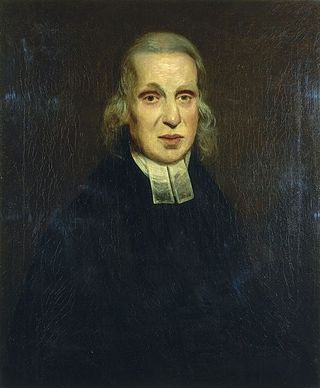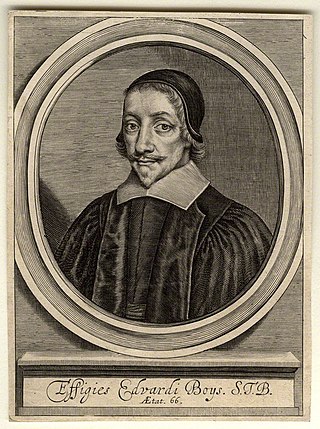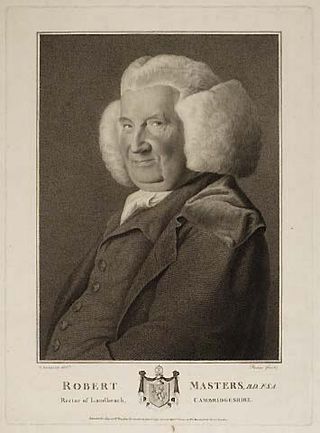Related Research Articles

Sir Nicholas Bacon was Lord Keeper of the Great Seal during the first half of the reign of Queen Elizabeth I of England. He was the father of the philosopher and statesman Sir Francis Bacon.

The Blickling homilies are a collection of anonymous homilies from Anglo-Saxon England. They are written in Old English, and were written down at some point before the end of the tenth century, making them one of the oldest collections of sermons to survive from medieval England, the other main witness being the Vercelli Book. Their name derives from Blickling Hall in Norfolk, which once housed them; the manuscript is now Princeton, Scheide Library, MS 71.
Edmund Allen was an English clergyman and scholar.

The Reverend Edmund Nelson was a British priest who was Rector of Burnham Thorpe in Norfolk and the father of Admiral Horatio Nelson.
Edmund Staunton (Stanton) (1600–1671) was an English clergyman, chosen by Parliament as President of Corpus Christi College, Oxford, and a member of the Westminster Assembly. Later he was a nonconformist minister.

Matthias Mawson was an English clergyman and academic who served as Master of Corpus Christi College, Cambridge and subsequently as Bishop of Llandaff, Bishop of Chichester, and Bishop of Ely.

St Bene't's Church is a Church of England parish church in central Cambridge, England. Parts of the church, most notably the tower, are Anglo-Saxon, and it is the oldest church in Cambridgeshire as well as the oldest building in Cambridge.

John Spencer (1630–1693) was an English clergyman and scholar, and Master of Corpus Christi College, Cambridge. An erudite theologian and Hebraist, he is best remembered as the author of De Legibus Hebraeorum, a pioneer work of comparative religion, in which he advanced the thesis that Judaism was not the earliest of mankind's religions.

Edward Henry Perowne was an English clergyman and college head, Master of Corpus Christi College, Cambridge.
Henry Mason was an English clergyman and theological writer.
Robert Newlyn (1597–1688) was an English clergyman and academic. He was president of Corpus Christi College, Oxford, from 1640 to 1648, was expelled by the parliamentary visitation of Oxford, and returned as president in 1660.

Edward Boys (1599–1667) was an English divine.
John, D.D. Barret, was an English Carmelite friar and after the Reformation an Anglican clergyman.
Alfred Inigo Suckling (1796–1856), surname originally Fox, was an English clergyman, an author and historian of Suffolk.

Robert Masters (1713–1798) was an English clergyman and academic, known as the historian of Corpus Christi College, Cambridge.
SirBassingbourne Gawdy, of West Harling, Norfolk, was an English lawyer and judge, knight, and Member of Parliament.
Edmund Castle (1698–1750) was an English churchman and academic, Master of Corpus Christi College, Cambridge from 1745, and Dean of Hereford in 1749.

Sir Edward Echyngham, , of Barsham and Ipswich in Suffolk, was a commander on land and at sea, briefly Constable of Limerick Castle, and Collector of Customs at Ipswich. He is remembered as the author of a letter to Cardinal Wolsey describing the death of Lord Admiral Howard at Brest in 1513. From 1485 the presence of the Howard Dukes of Norfolk was felt directly along the Barsham reach of the River Waveney from their possession of Bungay Castle.
George Gurney Mather Nicol (1856-1888) was a Sierra Leonean clergyman. He was the first African from a British colony to be educated at Cambridge University.

John Owen (1766–1822) was an English Anglican priest, a secretary on its foundation of the British and Foreign Bible Society.
References
- ↑ On the title-pages of his books Gurney spells his name Gurnay, but members of his family are usually described as Gurney.
- ↑ "Gurney, Edmund (GNY595E)". A Cambridge Alumni Database. University of Cambridge.
- ↑ Sufferings, pt. ii. p. 260
![]() This article incorporates text from a publication now in the public domain : "Gurney, Edmund (d.1648)". Dictionary of National Biography . London: Smith, Elder & Co. 1885–1900.
This article incorporates text from a publication now in the public domain : "Gurney, Edmund (d.1648)". Dictionary of National Biography . London: Smith, Elder & Co. 1885–1900.